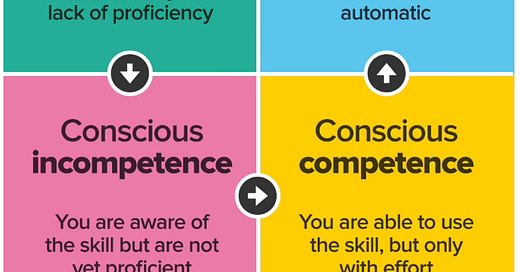(Originally published October 2024)
I started playing organized hockey in 1996.
My first year coaching was 2007.
Since 2013 I’ve been involved on a day-to-day basis at the university and pro levels.
Over the years I’ve probably attended close to 1000 hockey practices, from Novice C to NHL.
Here’s what I learned about getting better through practice:
Show up
Do the work
Don’t worry too much beyond 1 & 2
There are lots of Type-A personalities in high-level sports. The typical Type-A approach to practicing is to do everything at 100% intensity, with 100% focus on getting better.
Sounds like an effective mindset, and it is to a certain extent.
But this all-in mentality becomes counterproductive when you have a bad day.
Consider this: relative to expectations (their own, their coaches’, their parents’, etc.) NHL stars have as many bad days as a U10AAA player who’s on the ice five to six times a week.
It’s okay to have a bad day because it’s an essential part of getting better. If every bad day is accompanied by external and internal criticism, then a player is on their way to burnout. The solution is not to get better, because it doesn’t solve the root problem, but rather to care a bit less.
Watch a 15-year NHL vet go through practice. Sure, he’s on-task and engaged, but he’s not living and dying with every rep. He may get on the ice early or stay out late to work on specific details, but he’s not beating himself up for every mistake. (Unless he’s going through a really rough patch, that is. Again, NHLers are not so different than you and I.)
If you want to play hockey for a long time, you’ll need to perform. You’ll need to compete. But mostly you’ll need to get through it.
Another reason to care a bit less about how well you do in practice: it may help you improve faster.
Engaging in deliberate practice means moving from unconscious incompetence (step 1) toward unconscious competence (step 4). However the bulk of the process happens in between.
Progressing from conscious incompetence (step 2) to conscious competence (step 3) requires lots of reps and ongoing analysis, but going from step 3 to step 4 requires a degree of letting go that can feel quite foreign to those who’d just spent much time being self-aware and self-critical.
In sum, this process doesn’t care how much you care. If you do the work correctly, then the results will follow.




